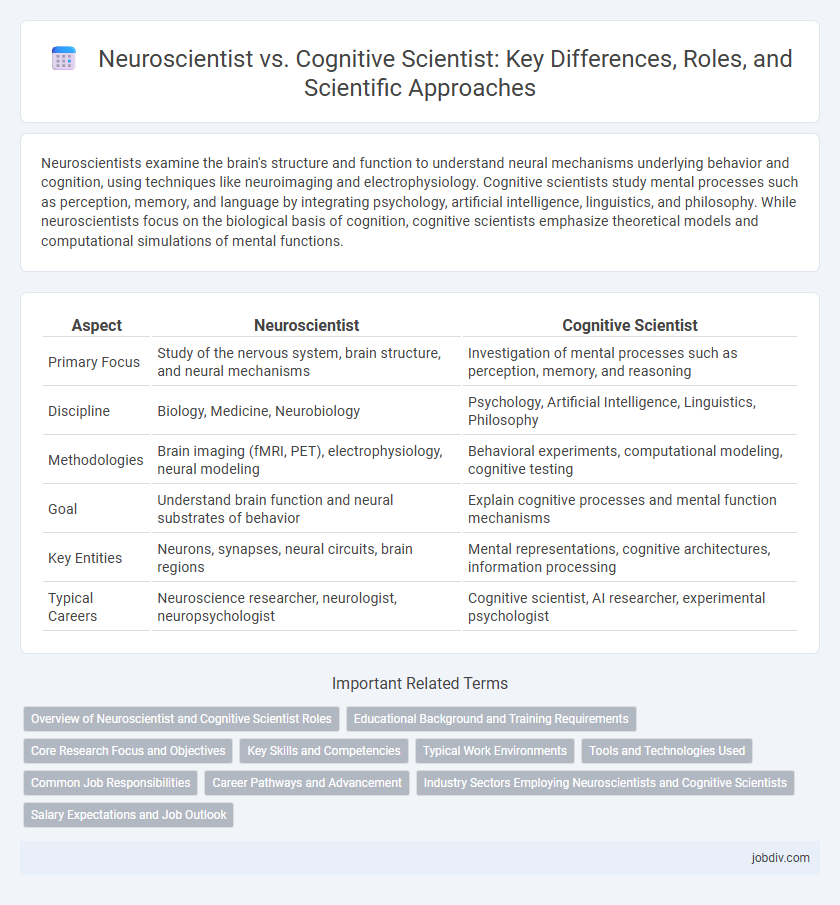Neuroscientists examine the brain's structure and function to understand neural mechanisms underlying behavior and cognition, using techniques like neuroimaging and electrophysiology. Cognitive scientists study mental processes such as perception, memory, and language by integrating psychology, artificial intelligence, linguistics, and philosophy. While neuroscientists focus on the biological basis of cognition, cognitive scientists emphasize theoretical models and computational simulations of mental functions.
Table of Comparison
| Aspect | Neuroscientist | Cognitive Scientist |
|---|---|---|
| Primary Focus | Study of the nervous system, brain structure, and neural mechanisms | Investigation of mental processes such as perception, memory, and reasoning |
| Discipline | Biology, Medicine, Neurobiology | Psychology, Artificial Intelligence, Linguistics, Philosophy |
| Methodologies | Brain imaging (fMRI, PET), electrophysiology, neural modeling | Behavioral experiments, computational modeling, cognitive testing |
| Goal | Understand brain function and neural substrates of behavior | Explain cognitive processes and mental function mechanisms |
| Key Entities | Neurons, synapses, neural circuits, brain regions | Mental representations, cognitive architectures, information processing |
| Typical Careers | Neuroscience researcher, neurologist, neuropsychologist | Cognitive scientist, AI researcher, experimental psychologist |
Overview of Neuroscientist and Cognitive Scientist Roles
Neuroscientists investigate the structure and function of the nervous system, emphasizing cellular and molecular mechanisms underlying brain activity and behavior. Cognitive scientists study mental processes such as perception, memory, language, and decision-making, integrating psychology, artificial intelligence, linguistics, and philosophy. Both fields overlap in exploring how brain function correlates with cognitive abilities but differ in their primary focus on biological substrates versus theoretical models of cognition.
Educational Background and Training Requirements
Neuroscientists typically hold a Ph.D. in neuroscience, biology, or related fields, often requiring extensive laboratory research experience in neurobiology, neurophysiology, and experimental methods. Cognitive scientists pursue interdisciplinary education combining psychology, computer science, linguistics, and philosophy, with training emphasizing cognitive theory, computational modeling, and experimental design. Both fields demand rigorous training but diverge in focus: neuroscientists prioritize understanding neural mechanisms, while cognitive scientists analyze mental processes and behavior through diverse disciplinary tools.
Core Research Focus and Objectives
Neuroscientists primarily investigate the biological mechanisms underlying brain function, emphasizing neural circuits, neurotransmitters, and brain anatomy to understand cognition and behavior at a cellular and molecular level. Cognitive scientists focus on mental processes such as perception, memory, language, and decision-making by integrating insights from psychology, computer science, and linguistics to model how information is processed and represented. Both fields aim to unravel aspects of human cognition, but neuroscientists emphasize physiological substrates while cognitive scientists prioritize computational and theoretical frameworks.
Key Skills and Competencies
Neuroscientists excel in understanding brain structure, neural pathways, and biochemical processes through techniques like neuroimaging and electrophysiology, emphasizing biological and physiological expertise. Cognitive scientists prioritize modeling mental functions, language processing, and decision-making, leveraging skills in computational modeling, experimental psychology, and linguistics. Both fields require strong analytical abilities and interdisciplinary collaboration, but neuroscientists focus more on biological mechanisms while cognitive scientists emphasize theoretical frameworks of cognition.
Typical Work Environments
Neuroscientists primarily conduct research in laboratory settings within universities, medical institutions, and research centers, utilizing advanced imaging tools and electrophysiological equipment to study brain function. Cognitive scientists often work in interdisciplinary environments such as psychology departments, artificial intelligence labs, and human-computer interaction centers, combining computational models with experimental data. Both fields frequently collaborate in academic or commercial research organizations focused on understanding cognitive processes and neural mechanisms.
Tools and Technologies Used
Neuroscientists utilize advanced neuroimaging technologies such as fMRI, EEG, and PET scans to investigate brain structure and function at a cellular level. Cognitive scientists employ computational modeling, eye-tracking devices, and behavioral experiments to explore mental processes like perception, memory, and decision-making. Both fields integrate data analysis software and machine learning algorithms to enhance the interpretation of complex neural and cognitive data.
Common Job Responsibilities
Neuroscientists primarily investigate the structure and function of the nervous system through experimental research and neural data analysis. Cognitive scientists study mental processes such as perception, memory, and decision-making using interdisciplinary methods including computational modeling and behavioral experiments. Both professionals collaborate to understand brain-behavior relationships and contribute to advancements in neurotechnology and cognitive therapy.
Career Pathways and Advancement
Neuroscientists typically follow career pathways rooted in biology, medicine, and research institutions, progressing through roles such as research associate, principal investigator, and clinical neuro specialist, emphasizing laboratory work and neurological disorders. Cognitive scientists often advance within interdisciplinary fields like psychology, computer science, and linguistics, moving from research assistant to cognitive modeler or human-computer interaction specialist, prioritizing experimental design and cognitive theory development. Career advancement for neuroscientists is closely tied to grant acquisition and publication impact, while cognitive scientists rely on contributions to artificial intelligence, cognitive psychology, and applied cognitive research for professional growth.
Industry Sectors Employing Neuroscientists and Cognitive Scientists
Neuroscientists are predominantly employed in pharmaceutical companies, biotechnology firms, and medical research institutions where their expertise in brain function and neurological diseases drives drug development and clinical trials. Cognitive scientists find opportunities in technology companies, especially in artificial intelligence, human-computer interaction, and educational technology sectors, leveraging their understanding of mental processes to enhance user experience and adaptive learning systems. Both fields also contribute significantly to academic research and government agencies focused on health policy and cognitive health initiatives.
Salary Expectations and Job Outlook
Neuroscientists earn an average salary ranging from $70,000 to $120,000 annually, driven by their expertise in studying the brain at a biological level, with a job outlook growing about 6% through 2032 due to advancements in medical research. Cognitive scientists typically see salaries between $60,000 and $100,000, reflecting their interdisciplinary work on mental processes, with employment expected to grow by approximately 8% as demand for AI and human-computer interaction expertise rises. Both fields require advanced degrees and offer robust research and academic opportunities, but cognitive science may present more diverse roles in tech industries while neuroscience focuses heavily on healthcare and pharmaceutical applications.
Neuroscientist vs Cognitive Scientist Infographic

 jobdiv.com
jobdiv.com